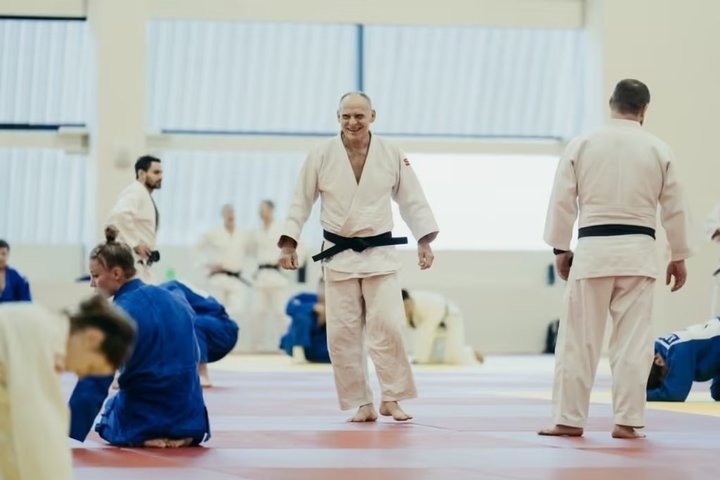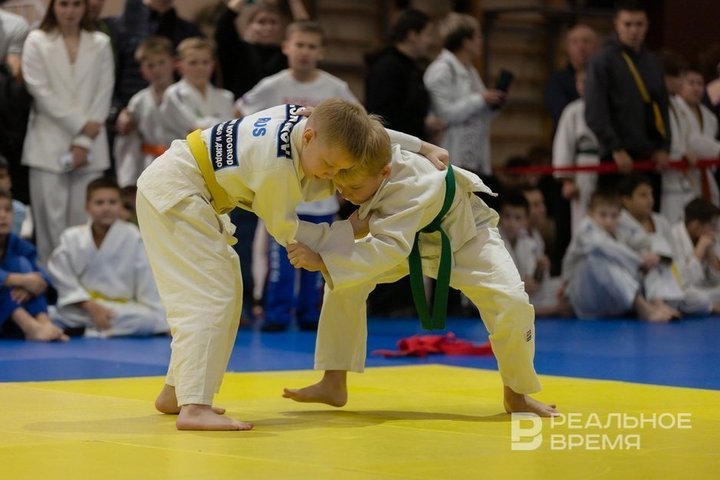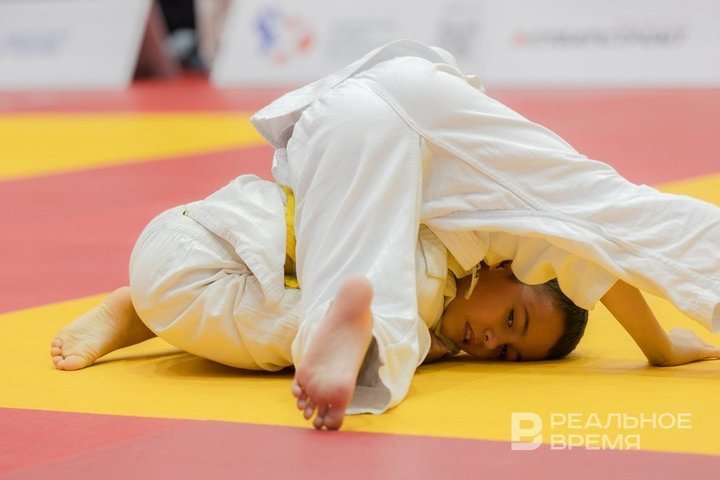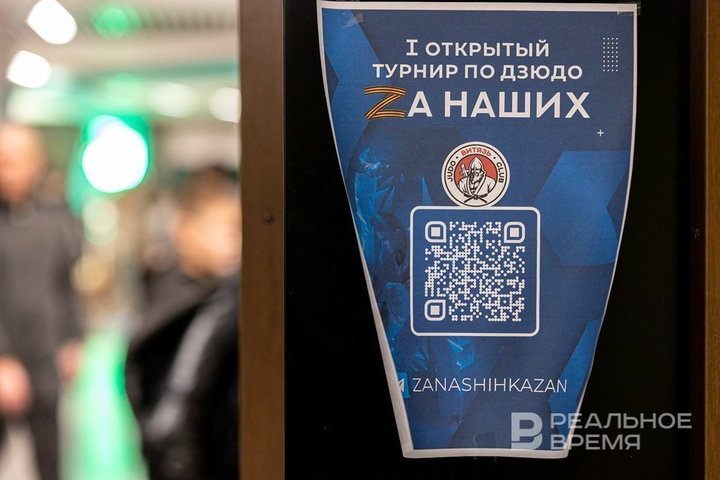Former Russian national judo coach Ezio Gamba holds training sessions in Kazan
Three-day adventures of an Italian in Russia

A three-day practical training session of Olympic champion and two-time world silver medalist Ezio Gamba was held at the Batyr Judo Center in Kazan. The Italian with a Russian passport trained the country's leading coaches under the Judo Technique Teaching Methodology programme. Read more about of the event held as part of the Academy of the Russian Judo Federation project in the report of Realnoe Vremya.
A name known since childhood
An Italian with a Russian passport, Ezio Gamba, 66, is a legend of world judo. Having made his Olympic debut in Montreal, four years later he came to Moscow, despite the boycott of the Games by Italy. However, if you look at the results of those starts, half of the gold was taken by athletes whose countries officially boycotted the 1980 Olympics. Van de Walle (Belgium), Parisi (France), Roethlisberger (Switzerland), even in the final fight in his weight category Gamba fought with another boycotter Neil Adams from England. He won, and Moscow became the happiest city for Gamba, since participating in three more Olympics, he then won only silver in Los Angeles. Having coached the Italian national team after finishing his career, in 2008 Gamba received an offer to head the national team of the country. This happened on the initiative of then President of the Russian Judo Federation Alexey Gordeyev, now Deputy Chairman of the State Duma. Four gold medals in London are a huge achievement of the Italian, as well as two victories in Rio de Janeiro, to which Gamba led his wards, already as a citizen of Russia.
True, since November last year, Gamba began working with the national team of Kazakhstan, which was left by local specialist Nurbol Suleimenov. Grigory Mshvidobadze worked there as a consultant, perhaps he helped his former coach of the Russian national team.

Sergey Soloveichik: “We have increased the number of seminars for coaches”
“One of the priority areas of our federation is the training of highly qualified personnel, — noted the president of the Russian Judo Federation Sergey Soloveichik. “Therefore, we have increased the number of seminars for coaches and are constantly working to improve their programme. Ezio Gamba is one of the best specialists in the world, a person who knows our country well, including from the point of view of regional coaches. He understands what needs to be worked on to be even more competitive.”
The current head of the country's judo federation, Soloveichik, is a top manager of the highest level, he is on good terms with the president of the International Judo Federation, Marius Vizer, with whom he interacted as the president of the European federation. Under them, Kazan received the right to host the European Championship. The fact that the former curling arena was rebuilt into a judo hall in Sirius is definitely a merit of the current leadership of the Russian Judo Federation. The conditions created there for judokas are simply out of this world, there are still no such judo centres in the world.
Now Soloveichik has to work in difficult conditions, but there are also positive changes. On the one hand, boxing, wrestling, taekwondo and judo became the four main international federations with which Russia continued to interact, participating in international competitions, on the other hand, the connections of the head of the national federation, who headed the European federation for 15 years, have an effect.
In addition, modern judo is largely our former neighbours in the Soviet Union, but not Ukraine and the Baltics, but Georgia, Azerbaijan, the republics of Central Asia. In judo, in general, the number of countries that are unfriendly to Russia is minimal. This also contributes to holding international competitions with virtually no demarches, wrestlers shake hands with each other without problems, hug after fights.

Visible and invisible obstacles for Russians
The upcoming start for Russian judokas is the European Championship in Montenegro from April 23 to 27. So far, there are no problems with participation. On the one hand, this can be explained by the fact that the head of the International Judo Federation, Marius Vizer, after being elected president, said he has many friends among Russians, he loves Russia, the history of this country. His Russian friends and colleagues in judo are now waiting for him at the hotel, he wanted to share with them his enthusiasm about the election. As for “friends among Russians,” eyewitnesses claim that this number includes Russian President Vladimir Putin. On the other hand, it is necessary to remember that one of the first international starts in Russia that was cancelled was the Grand Slam stage in Kazan, for which Tatarstan and Russia managed to pay significant funds. Yes, then the refusals rained down like a horn of plenty, but the International Judo Federation was among the first to come out with the cancellation. In addition, professionals note that the leadership of the international federation has made changes to the rules, cancelling the amplitude throws, which were originally considered the trump card of Russian judokas.
It is also necessary to remember that international federations are not omnipotent in terms of admitting athletes to starts. Just the other day, titled Russian wrestler Abdulrashid Sadullaev (freestyle wrestling) was not issued a visa to Slovakia to participate in the European Wrestling Championship. This was a repeat of the situation last year, when Sadullayev was not allowed into Romania for the European Championship, although he was then allowed to compete in the World Championship in Albania.

My First White Belt
Now about the activities of the Republican Judo Federation. Previously, studying the geography of the presence of this type of martial arts in Tatarstan, it turned out that almost half of it did not develop judo, there were not enough coaches, many simply did not want to move to the regions. Now an increase in mass participation is obvious. Over the past few years of the Tatarstan Federation, through joint efforts, the number of people involved has increased from four to seven thousand people. There are several judo development programmes, including My First White Belt and Family Judo. Many of them apply to comprehensive schools. The same My First White Belt is the interaction of a trainer with a physical education teacher, when the programme allocates 10 hours of training in one of the basics — the ability to fall correctly, the simplest techniques. Upon completion of the programme, its participants are given their first white judo belt with the prospect of either joining the section themselves or continuing the cooperation of the trainer with this school.
There is another direction that brings to mind the practice that existed in the USSR of sending students from the districts for training and subsequent work. If the district is not ready to pay for the student's education, the republican federation is ready to take it upon itself, provided that the graduate works for at least five years. This practice, among other things, helps to implement the judo development program in Tatarstan, adopted for the next five years. It includes the annual opening of judo sections in the districts of the republic, and recently several more municipalities of the Republic of Tatarstan have joined the judo family: Vysokaya Gora, Pestretsy, Agryz, Kukmor, Kaibitsy. An interesting case happened with the last settlement, when a guy, after graduating from MGIMO, wanted to become a coach and went to Kaibitsy District.

JuDobroe Delo
JuDobroe Delo programme is actively developing, participation in which helps the process of raising the younger generation. Participants in the program are engaged in good deeds, in particular, they help with cleaning animal shelters, with purchasing food for needy families. One large family with two disabled children was helped to clear an abandoned vegetable garden of 30 acres, fixed a fence, dug a compost pit, in general — it was a good replacement for strength training.
Not relying only on their own strength, the federation calls on the classics for help. But not wrestling, as one might think in the context of colleagues from Greco-Roman wrestling, but classics of literature. The fact is that for young judokas, reading books has been introduced as a mandatory requirement, the list of which is discussed initially. This includes classical literature, and specialized — sports, a total of about 70 books that students must read and retell. Two months are given for three books, after reading the judokas tell the instructors about what they have read, understood and analyzed.
If you do not instil something bright in the souls of the students, then judo classes can be equated to the uncontrolled distribution of weapons. Therefore, when teaching students how to master martial arts, trainers simultaneously instil in them the concept of how, when and to what extent it should be used. This process was given the definition of JuDobroe Delo.